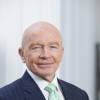Mark Mobius

Mark Mobius
Joseph Mark Mobiusis an emerging markets fund manager at Franklin Templeton Investments. Mark Mobius, Ph.D., executive chairman of Templeton Emerging Markets Group, joined Templeton in 1987. Currently, he directs the Templeton research team based in 18 global emerging markets offices and manages emerging markets portfolios. In 2015, after leading the company for a quarter of a century, Mark Mobius decided to step down as the lead manager of the Templeton Emerging Markets Investment Trustand handed over control of the fund...
NationalityAmerican
ProfessionBusinessman
Date of Birth17 August 1936
CountryUnited States of America
China and the U.S. have a very symbiotic relationship which will not decline any time soon. There are more shared interests as compared to shared differences and for this reason relations will continue to be good.
I have just come back from Dubai and there is a lot of interest in India.
When you consider the sheer magnitude of investable equities to choose from in the world's emerging markets, you realize that finding one that looks attractive enough to warrant investing your faith and assets in is as formidable a task as finding a needle in a haystack. Fortunately, researching investment opportunities is a lot more interesting than digging for needles in haystacks.
We believe that in the long term, Russia has very, very good value,
People are getting inured to the whole terrorism thing,
We're not at the danger stage yet, but we are at danger of getting there - and history does repeat itself.
We were investing at this terrible time when emerging markets were all going down, some by 90-odd percent, and we are now benefiting from that, ... You had one crisis after another. You had Russia, Brazil, Thailand. We were investing in all of them.
It's quite difficult to ascertain the real hits on earnings, as a lot will depend on how fast the government is to implement the new price mechanism, and how high oil prices will go from here.
The new administration will make every effort to keep things on an even keel, business as usual. The Chinese are very happy to let Hong Kong hum along. As far as we are concerned, there is no reason to believe that because of change in the political administration there would be an impact on the financial market.
It's really a change in the macroeconomic environment.
The mere fact that me, an emerging markets person, says something about Internet and the market reacts the way it has is and indication that people are very jittery.
Their foreign reserves are down. Usually when governments claim they will not devalue, just the opposite occurs (and) if the ruble is devalued then there will be political fallout, so I think they must protect the ruble at all costs.
Their foreign reserves are down, ... Usually when governments claim they will not devalue, just the opposite occurs (and) if the ruble is devalued then there will be political fallout, so I think they must protect the ruble at all costs.
It's in the lowest point that it will be,